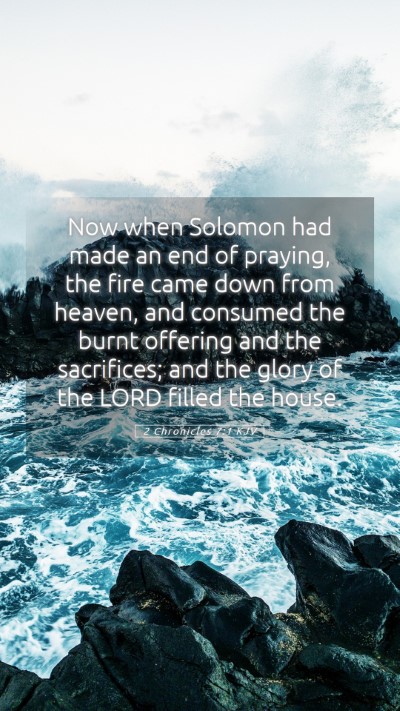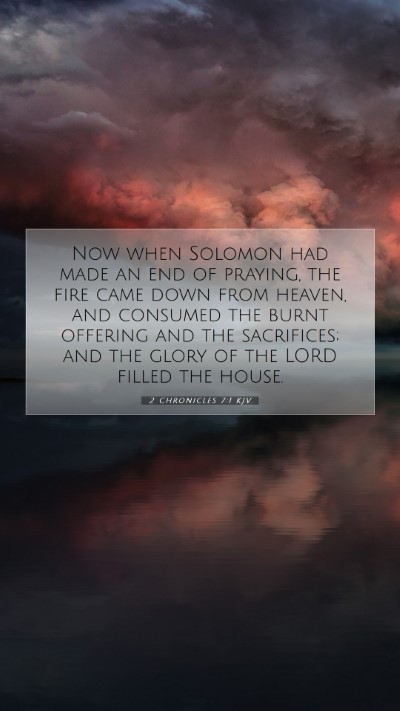Understanding 2 Chronicles 7:1
2 Chronicles 7:1 states, "Now when Solomon had made an end of praying, the fire came down from heaven, and consumed the burnt offering and the sacrifices; and the glory of the Lord filled the house."
Bible Verse Meanings
This verse marks a significant moment in the history of Israel, particularly during the dedication of Solomon's temple. The descent of fire from heaven and the filling of the temple with God's glory signify divine approval and presence, emphasizing God's acceptance of Solomon's prayers and the sacrifices offered.
Bible Verse Interpretations
- Divine Affirmation: The act of fire consuming the offerings symbolizes God's acceptance of the sacrifices made for atonement and worship.
- Presence of God: The 'glory of the Lord' represents God's holiness and His covenantal relationship with Israel, highlighting His promise to dwell among His people.
- Response to Prayer: Solomon's prayer preceding this event demonstrates the power of earnest supplication, reinforcing that God honors heartfelt prayers.
Bible Verse Understanding
In understanding this scripture, it's crucial to recognize the historical context of Israel's monarchy and the temple's significance as the center of worship. Solomon's dedication reflects the culmination of David's desire to build a permanent dwelling for God, established now as a place of divine encounter.
This moment illustrates the relationship between obedience, worship, and God's manifest presence, which is a theme woven throughout both the Old and New Testaments.
Bible Verse Explanations
This passage serves several explanatory functions:
- Symbol of Holiness: The fire signifies God's purifying nature—consuming what is evil and sanctifying what is good.
- Illustration of Worship: The act of sacrifice was foundational to worship in ancient Israel; here, it illustrates the transition from individual to communal worship.
- Covenantal Significance: It reinforces God's covenant with Israel, as temples were indicators of His presence and favor. The glory filling the house points to His commitment to be with His people.
Commentary Insights
Here are insights based on renowned public domain commentaries:
- Matthew Henry: Henry elaborates on the miraculous nature of the fire's descent, suggesting it illustrates God’s approval of Solomon’s prayer and the devotion of the people.
- Albert Barnes: Barnes notes the significance of God’s glory filling the temple, emphasizing that this was a literal manifestation of divine presence as a response to Solomon’s dedication.
- Adam Clarke: Clarke highlights the importance of this event in Israel's history as a pivotal moment signifying divine recognition and the establishment of a formal worship protocol within the temple.
Cross References
For further study, consider the following Bible cross references:
- Exodus 40:34-35: The cloud covering the Tabernacle.
- 1 Kings 8:10-11: The glory of the Lord filling the temple.
- Leviticus 9:24: Fire consuming the offerings at Aaron's ordination.
Application of 2 Chronicles 7:1
Understanding this verse provides insight into how we approach worship and prayer today. Just as Solomon's dedication was marked by reverence and heartfelt petition, modern believers are called to approach God with sincerity and openness in their worship.
This verse compels us to reflect on our own sacrifices—whether they be acts of service, time dedicated to God, or our prayers—and examine if they meet with God's acceptance.
Conclusion
Reflecting on 2 Chronicles 7:1 through Bible verse meanings and interpretations deepens our understanding of God's nature and His desire for a relationship with us. It highlights the importance of sincere worship and the transformative power of prayer.
As we study this passage, we are encouraged to seek divine presence in our own lives, inviting God's glory to fill our hearts and homes as we engage in authentic worship.


